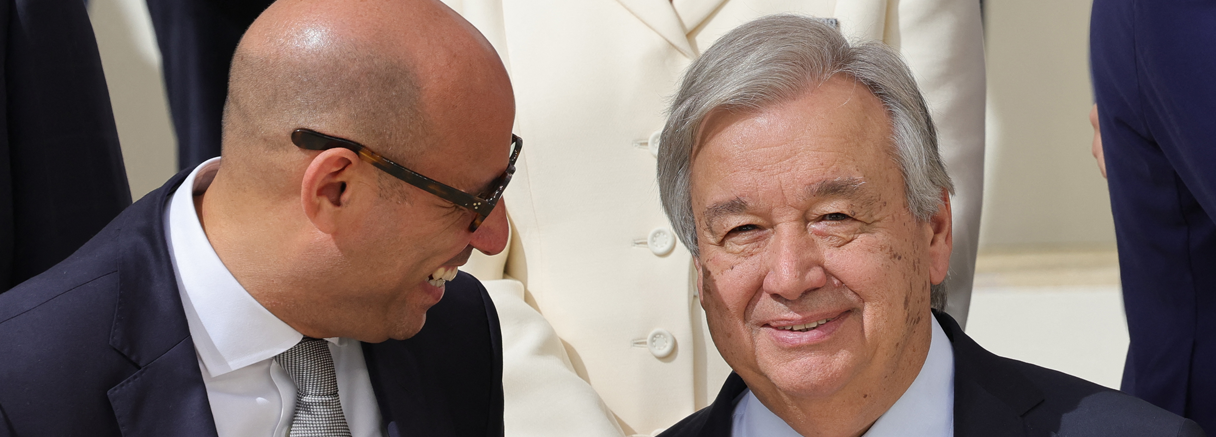Where have we come from? Journey through the UN climate talks

The United Nations is leading the fight against climate change by organising yearly Conferences of the Parties (COPs) under the United Nations Framework Convention on Climate Change (UNFCCC).
These meetings are crucial for global cooperation, resulting in essential agreements that shape the world's response to this critical issue. Key events have shaped the fight against climate change and influenced our understanding of and strategies to combat this global crisis. These events include:
1988:
Climate scientist James Hansen's testimony before the U.S. Congress signals the urgent need to address human-induced planetary warming. Hansen told the congress, "It
is time to stop waffling so much and say that the evidence is pretty strong that the greenhouse effect is here."
1990: Geneva, Switzerland
The UN's Second World Climate Conference underscored the risks of global warming, emphasising the necessity of binding emissions targets. It considered the role, priorities, and programme structure for the future development of the World Climate Programme.
1992: The Earth Summit, Rio de Janeiro
The Rio Conference laid the groundwork for the UNFCCC, establishing an international framework to combat "dangerous human interference with the climate system" and to stabilise greenhouse gas concentrations in the atmosphere.
1995: COP1: Berlin
The Berlin Mandate was adopted, which required the parties to initiate talks to reduce emissions beyond 2000 using quantitative objectives and specific deadlines. COP1 concluded with a call for legally binding emissions targets.
1997: COP3: Kyoto, Japan
A pivotal moment channeled the adoption of the Kyoto Protocol, which acknowledged that individual countries have different capabilities in combating climate change. It sought to reduce the onset of global warming by reducing greenhouse gas concentrations in the atmosphere to "a level that would prevent dangerous anthropogenic interference with the climate system."
2009: COP15: Copenhagen, Denmark
The Copenhagen Summit (COP15) fell short of a formal treaty. It resulted in the Copenhagen Accord, which was meant to cap the rise in global temperature by committing to significant emission reductions and raising funds to help the developing world address climate change.
2015: COP21: Paris, France
A breakthrough emerged at COP21 with the adoption of a legally binding international treaty, the Paris Agreement. This pact establishes a long-term goal of limiting global warming to well below 2 degrees Celsius, with aspirations to reach 1.5 degrees Celsius. It provides a pathway for developed nations to assist developing nations in their climate mitigation and adaptation efforts while creating a framework for the transparent monitoring and reporting of countries' climate goals.
2021: COP26: Glasgow, Scotland
Building on the Paris Agreement, nations adopted the Glasgow Climate Pac in 2021, aiming to turn the 2020s into a decade of climate action and support. Market mechanisms and non-market approaches, transparent reporting of climate actions, and support provided or received, including for loss and damage, were discussed. There, nations reaffirmed their duty to fulfill the pledge of providing 100 billion dollars annually from developed to developing countries.
2022: COP27: Sharm El-Sheikh, Egypt
COP27 intensified climate action, closing with a breakthrough agreement to provide loss and damage funding for vulnerable countries hit hard by floods, droughts, and other climate disasters. It facilitated the Sharm El-Sheikh Implementation Plan, which emphasises the urgent need for global greenhouse gas emission reductions across the energy sector and recognises the need for energy systems to be secure, reliable, and resilient.
The Road Ahead- COP28
Due to the increasing climate crisis, the UN climate negotiations remain critical for international
cooperation. The COP28 in Dubai, United Arab Emirates, in the next two weeks, is expected to be a turning point.
Key expectations for COP28 include accelerating action to reduce greenhouse gas emissions, enhancing climate finance, addressing loss and damage, and promoting innovation and collaboration. Specific issues likely to be discussed include the phase-out of fossil fuels, the role of carbon markets, the protection of forests, and the adaptation of vulnerable communities.